Dental Implant in Johannesburg
Search and Compare the Best Clinics and Doctors at the Lowest Prices for Dental Implant in Johannesburg
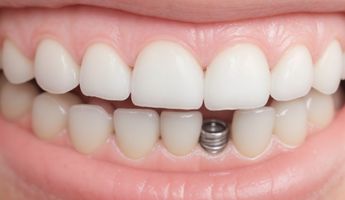
Find the best clinics for Dental Implant in Johannesburg
With Medijump you can browse 4 facilities offering Dental Implant procedures in Johannesburg. The cheapest price available is $3,501 in Cape Town. And for the cheapest price globally, prices start from $1 in Vietnam.
Dental Implant in South Africa
Price: $ 3,501
Dental Implant in Cape Town
Price: $ 3,501
Vietnam offers the best prices Worldwide
Price: $ 1
From 18 verified reviews
Neshar Madhura, 17 September 2020
The dermatologist, Dr Ayanda M. Is the greatest to ever happen to my son , who has been struggling with extreme ezcema from a young age and now a young adult. She has not only cleared the bad skin away but has kept it well under control. Humbled by her genuine care, warmth and professionalism. We travel a few kilometers for your services. Thank you
From 72 verified reviews
Charlotte Sorour, 13 March 2020
Parking is a huge problem.On a positive note it is a great hospital with great specialists and doctor's hence why it is so busy. Well worth driving around a bit looking for parking knowing your loved one's are in good hands. My mind at ease. My husband is well looked after. Thank you Linksfield staff :)
From 38 verified reviews
Nompumelelo Madliwa, 19 April 2020
I had such a wonderful experience there with Dr Thomas, I had a skin drafting done it was such a smooth process I am healing very well and had a great stay there, Thank you so much
Hyde Park Dentist, located in Council St, Johannesburg, South Africa offers patients Dental Implant procedures among its total of 36 available procedures, across 2 different specialties. Currently, there's no pricing information for Dental Implant procedures at Hyde Park Dentist, as all prices are available on request only, whilst the national average price is approximately $5,329. There are many specialists available at the Dental, with 4 in total, and they have multiple recognized accreditations, including: ITI - International Team for ImplantologyHPCSA - Health Professions Council of South AfricaSADA - South African Dental AssociationSAAAD - South African Academy Of Aesthetic Dentistry
- Home
- South Africa
- Johannesburg
Compare Before & After Photos of _procedure_photos.phpDental Implant

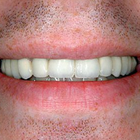
Front view


Front view
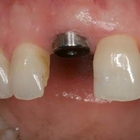
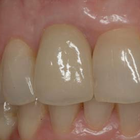
Front view
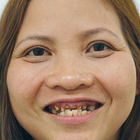

Front view


Front view
WHY US?
At Medijump, we're making medical easy. You can search, compare, discuss, and book your medical all in one place. We open the door to the best medical providers worldwide, saving you time and energy along the way, and it's all for FREE, no hidden fees, and no price markups guaranteed. So what are you waiting for?

Free

Best Price

Widest Selection

Risk-Free
What you need to know about Dental Implant in Johannesburg

A dental implant is a medical device that provide support to artificial teeth. It's surgically placed into the jaw to act as a replacement for the root of a missing or damaged tooth, which in turn serves to hold a replacement tooth or bridge. It functions and looks much like a real tooth, restoring your ability to chew and improves your overall appearance. Dental implant surgery is considered as a better alternative to dentures or bridgework that does not fit well. It also offers a great option for people when they do not have enough natural teeth roots left to build denture or bridgework replacements.
Since dental implants eventually fuse with your jawbone over the span of several months, it won’t make noise, slip, or cause bone damage the way dentures or bridgework might. Dental implants also enable natural speech, look and feel like your own teeth, make eating easier, and improves your appearance. However, the surgery may involve several stages, and, in some cases, it may require two separate visits to the clinic to complete. Ensure to look for a specialist in a reputable clinic for the best results.
What is the cost of Dental Implant in Johannesburg?
Price differences abound in Johannesburg for Dental Implant based on the clinic, the proficiency of the surgeon, and the individual requirements of the patients. It's essential to realize that dental insurance usually doesn't cover the entire bill for this treatment, though it might cover a part. Several dental clinics provide finance schemes or payment alternatives to assist in easing the financial burden. For more precise cost estimates, reach out to your dental service provider or a nearby clinic.
What does a Dental Implant Procedure Involve?
Dental implant surgery generally requires several stages. Each stage may be performed under general or local anesthetic. The first stage is removing the damaged tooth. Then, if your jawbone is too soft or not thick enough, your dentist may perform bone grafting to create a more solid base for the implant. The bone graft may be natural (taken from another part of your body) or synthetic (a bone-substitute material). If you only need minor bone grafting, the implant surgery can be performed on the same day. However, if you need a significant amount of bone graft, the implant surgery may have to be postponed until the transplanted bone grows enough new bone to support the dental implant.
The next stage after the damaged tooth removal and bone graft (if you need one) is placing the dental implant. To do this, your dentist makes an incision to expose the bone and puts the metal implant post deep into the bone. At this stage, you will still have a gap where your tooth is missing. Your dentist will place a temporary denture for appearance. Once the metal implant post is placed, osseointegration begins. This is a process where the jawbone grows into the surface of the implant and can take several months to complete. After osseointegration is complete, your dentist will place the abutment, which is a small connector post that will hold your new tooth. The final stage, after the abutment is placed, is placing the crown, which is the tooth-looking part. You can choose between a removable crown and a fixed crown.
How Long Should I Stay in Johannesburg for a Dental Implant Procedure?
The length of your stay in Johannesburg for a Dental Implant depends on numerous considerations like the intricacies of the procedure, the quantity of implants required, and your personal recovery process. Each stage of dental implant surgery is done in separate appointments. After each appointment, you should be able to leave the hospital or clinic right away. However, you should stay in Johannesburg for at least 2 weeks for completion of the work, the initial recovery time, and follow-up checkups.
What's the Recovery Time for Dental Implant Procedures?
The recuperation duration following a Dental Implant or dental implant operation can widely vary and is shaped by multiple aspects. Initial healing of the tissue might require only a handful of days, but complete osseointegration (the fusion of the implant with the jawbone) generally spans several months. This window could be extended for patients requiring auxiliary procedures such as bone grafts, or those with prevailing health issues that may impede the healing process.
Post-procedure, it's not unusual to experience a degree of discomfort, which could manifest as minor pain, swelling of your gums and face, skin and gum bruising, and slight bleeding. Such symptoms are a standard phase of the recovery process and should alleviate within a fortnight. In this interim, it's advisable to stick to a soft diet to not overload the implant site with undue pressure. Any strenuous physical exertion should be put off to circumvent potential complications.
Maintaining excellent oral hygiene is paramount to facilitate healing and stave off infection. Regular brushing and flossing, being particularly gentle around the surgical area, coupled with rinsing your oral cavity with warm saline water, can contribute to keeping the region hygienic.
What sort of Aftercare is Required for Dental Implant Procedures?
After each stage of surgery, you may have to eat soft foods. Since you may experience swelling, bruising, pain, and minor bleeding, your dentist will prescribe pain medications or antibiotics to help ease your discomfort. During your recovery period, you need to avoid smoking as it can contribute to implant failure and complications.
No special care is required for dental implants. Nonetheless, you need to practice good oral hygiene in order to maintain the implant and your remaining natural teeth. Make sure to brush your teeth twice a day, floss daily, and rinse your mouth with an antiseptic mouthwash. You also need to see your dentist regularly and avoid damaging habits, such as chewing hard items.
What's the Success Rate of Dental Implant Procedures?
The efficacy of Dental Implant, alternatively referred to as dental implants, in Johannesburg, is typically impressive, boasting effectiveness percentages as high as 98% in some studies. This positions dental implants as one of the most reliable procedures within dental care's realm. Nevertheless, it's worth mentioning that the success rates might fluctuate, influenced by several factors.
The patient's overall health is a key determinant of the thriving outcome of a dental implant procedure. Individuals exhibiting optimal health usually witness higher success rates. Pre-existing health issues like diabetes, osteoporosis, and periodontal ailments can theoretically impact the efficacy of the implant.
Additional contributing factors to the success rate encompass the quality and abundance of the individual's bone structure. Patients boasting plentiful, healthy bone are ordinarily the perfect candidates for dental implants. However, those who have experienced bone loss might need to undergo a bone grafting procedure before the implant procedure. This step can provide a robust base for the implant and enhance the chances of a successful result.
Are there Alternatives to Dental Implant Procedures?
If you are not a candidate for dental implant surgery, or you simply do not want to undergo the procedure, you can opt for the alternatives. The alternatives include:
- Mini dental implants, which is a small type of dental implants. The structure is similar to regular dental implants, but are somewhat smaller in size. Unlike regular dental implants, dentists can often place mini implants only in one visit using local anesthesia. You may also be able to use your new teeth on the same day.
- A same-day implant is essentially similar to traditional dental implants. However, your dentist performs the whole process in just one day, skipping the process of wound healing and osseointegration.
- Implant-supported dentures or All-on-4 is an alternative if you need to fix a complete upper or lower set of teeth. During this procedure, four to six implants are placed into your jawbone as a base to attach and stabilize your denture.
What Should You Expect Before and After the Dental Implant Procedure?
Grasping what lies ahead before and post the Dental Implant can lessen potential worries and guarantee you are fully equipped for the upcoming journey. Prior to the procedure, your dental practitioner will conduct an all-inclusive dental assessment. This check-up may encompass dental X-rays and sophisticated 3D imaging to examine the status of your oral cavity.
The dental professional will also explore your medical history. If you're suffering from specific heart disorders or orthopedic implants, your dental practitioner might suggest antibiotics to avert infection. A personalized treatment blueprint, customized to your circumstances, will be constructed. This strategy takes into account factors like the amount of teeth you need substituted and the state of your jawbone. The procedure is typically carried out under local anesthesia to mitigate any discomfort.
Subsequent to the operation, experiencing slight unease is usual. You might witness inflammation of your face and gums, discoloration of your skin and gums, soreness at the insertion area, and insignificant bleeding. Your dental specialist will recommend medications to soothe these indicators. In case inflation, unease, or any other complications intensify in the days post-operation, it's crucial to reach out to your oral surgeon. Post-operation will require you to consume mushy foods as the operated site recovers. Moreover, you'll be guided to abstain from smoking, as it can hinder recovery and influence the triumph of the dental implant.
Following the positioning of the implant, the healing process, and fusion with the bone (osseointegration) transpire over an extended period. During this interval, maintaining robust oral cleanliness is vital. This involves frequent brushing, the use of dental floss, and cleansing with an antibacterial mouthwash. Periodic dental examinations are obligatory to track progress and confirm the well-being and effectiveness of the implant.
What are Potential Risks of Dental Implant?
Despite Dental Implant boasting remarkable effectiveness, it is, as any surgical operation, not without risks and potential difficulties. The chances of encountering these issues are often minute and irregularities are infrequent, yet it remains critical for patients to comprehend these possibilities before undertaking the procedure.
Complications and side effects may include:
- Implant failure
- Nerve injury
- Infection
- Sinus problems
- Damage to surrounding structures, such as other teeth or blood vessels
How long does a Dental Implant last?
The durability of a Dental Implant is heavily reliant on the individual's oral cleanliness and general wellbeing. Nonetheless, with appropriate upkeep and care, dental implants have the potential to stand the test of time. The titanium pillar inserted into the jawbone during surgery is crafted to be everlasting, while the dental cap fastened to the anchor may necessitate substitution every decade or decade and a half due to normal usage. Yet, with outstanding dental management and habitual screenings, the cap has the potential for lifelong endurance.
Whilst the information presented here has been accurately sourced and verified by a medical professional for its accuracy, it is still advised to consult with your doctor before pursuing a medical treatment at one of the listed medical providers
No Time?
Tell us what you're looking for and we'll reachout to the top clinics all at once
Enquire Now

Popular Procedures in Johannesburg
Prices Start From $1

Prices Start From $1

Prices Start From $48

Prices Start From $1

Prices Start From $1

Prices Start From $11

Prices Start From $1

Prices Start From $45

Recommended Medical Centers in Johannesburg for Dental Implant

- Interpreter services
- Translation service
- Religious facilities
- Medical records transfer
- Medical travel insurance
- Health insurance coordination
- TV in the room
- Safe in the room
- Phone in the room
- Private rooms for patients available

- Interpreter services
- Translation service
- Religious facilities
- Medical records transfer
- Medical travel insurance
- Health insurance coordination
- TV in the room
- Safe in the room
- Phone in the room
- Private rooms for patients available

- Interpreter services
- Translation service
- Religious facilities
- Medical records transfer
- Medical travel insurance
- Health insurance coordination
- TV in the room
- Safe in the room
- Phone in the room
- Private rooms for patients available

- Interpreter services
- Translation service
- Religious facilities
- Medical records transfer
- Medical travel insurance
- Health insurance coordination
- TV in the room
- Safe in the room
- Phone in the room
- Private rooms for patients available

- Interpreter services
- Translation service
- Religious facilities
- Medical records transfer
- Medical travel insurance
- Health insurance coordination
- TV in the room
- Safe in the room
- Phone in the room
- Private rooms for patients available
Dental Implant in and around Johannesburg
About Johannesburg
Johannesburg is the most populous as well as the largest city in South Africa. There is a lot to see and do in Johannesburg. Home to the Apartheid Museum, it is the perfect place for anyone who loves history and wants to learn more about the country’s past. There are also MOAD and MuseuMAfriCA that exhibit the city’s art and history. Other than the museums, the metropolitan city has a number of other things to do, such as enjoying Gold Reef City, shopping in its many markets, and visiting The Cradle of Human Kind.
Today, people have found a new reason to visit Johannesburg: medical tourism. Although it is not as widely known as other medical tourism destinations in other parts of the world, the city has seen a steady rise in medical tourists. The urban city features public and private medical centers with the highest standards, well-trained medical practitioners, and cutting-edge technology. Most of the medical centers have English speaking doctors, nurses, and staff, so there is no language barrier for foreign medical tourists. Plastic surgery, particularly tummy tuck, is one of the more popular procedures since it is much cheaper here than in Western countries.
Popular Areas in Johannesburg
While Johannesburg is not a popular tourist destination, there are a number of things to see and do in the city. The city is mostly known as Nelson Mandela’s home and has an array of astonishing museums. Those who love history and want to learn about the country’s struggle will enjoy the Apartheid Museum. It exhibits the story of apartheid through photographs, film footage, clippings, newspaper, and artifacts. Mandela House in Soweto Street is also worth a visit. It was once Nelson Mandela’s home. The museum showcases photographs, paintings, as well as awards and recognitions earned by Nelson Mandela.
One of the most popular places is the Lion Park. The safari park offers an amazing chance to watch lions and several other animals up close. There are also other activities such as animal interactions and hand-feeding a few animals, such as ostriches and giraffes. Other than the Lion Park, Pilanesberg National Park is famous among wildlife enthusiast. The national park is filled with opulent ecosystem and wildlife. Tourists can experience a safari and spot lions, rhinos, elephants, leopards, zebras, and over 300 bird species in their natural habitat.
Johannesburg is popular for its art and you must visit the Maboneng Precinct where you will find art-studios and shops selling art pieces. Wits Art Museum is another great place to admire African art. If you want to know more about the culture, Lesedi Cultural Village is the best place to go. Here, tourists can learn more about traditional South African culture and a chance to encounter people of Zulu, Pedi, Ndebele, Xhosa, and Basotho origin. Other places including SAB World of Beer, Gold Reef City, Holly Hill, Market Theatre, Constitution Hill, and Mary Fitzgerald Square are also a must-visit.
Weather and Climate in Johannesburg
Johannesburg experiences a subtropical highland climate. The summer, which runs from October to April, is characterized by hot days with thundershowers in the afternoon and cool evenings. The temperature is mostly mild during the summer. January is one of the hottest months, with an average maximum daytime temperature of 25.6 °C. The summer has an extreme UV index, sometimes reaching as high as 14-16. Therefore, tourists must wear sun-protective clothing and apply sunscreen during the day to avoid sunburn.
In the winter, the city enjoys sunny days and cold nights. This season is dry, and the average maximum temperature is around 16 °C. In June and July, the temperature can drop to 4.1 °C and occasionally drops below freezing at night. The freezing temperature causes frost, but snow is rare. It is advisable to bring warm clothing during this season.
Getting Around in Johannesburg
International visitors usually arrive at O. R. Tambo International Airport, also known as Johannesburg International Airport. It is Africa’s busiest airport and the primary airport that serves domestic and international travel. The airport connects South Africa with various cities all over the world, including London, Abu Dhabi, Atlanta, Singapore, and Sydney. It is the hub for South Africa’s largest domestic and international airlines, South African Airways. Budget airlines such as FlySafair, Mango, and Kalula operate flights from this airport for an inexpensive travel option.
Johannesburg has a vast public transport system. The Gautrain rapid-rail is safe and fairly easy to navigate. The rail also links the city center with O. R. Tambo International Airport. For efficient transport, tourists can opt for the Rea Vaya bus service that has a circular route through the city and is useful to explore the City Center at a reasonable cost. Many locals will use the minibus taxi network, but it can be pretty confusing for foreign tourists. Passengers need to know a route to their destination, hail the minibus taxi from the street, and once they have arrived at their desired destination, they need to make a hand signal to stop the minibus.
Metered taxis are available but can be quite expensive. The taxis are mostly found outside hotels. Since there are only a few places to hail a taxi in the street, the best way to hail a taxi is by phone. Be careful because many taxis do not use meters so tourists would need to negotiate the price before getting in. The most reliable metered taxis are Orange Cabs, Quick Cab, and Zebra Cabs. Uber is also available for safer, quicker, and more affordable transport.
Tourist Visas in Johannesburg
All visitors who wish to enter South Africa must hold a passport valid for at least 30 days after the expiration of their intended visit and must have at least two unused pages. Passport holders of more than 60 countries can enter and stay for up to 90 days in the country without a visa. Other nationals not listed in the visa exemption agreement must obtain a visa to the nearest South Africa embassy or consulate. The South Africa Immigration Department also offers Medical Treatment Visa for medical tourists.
Additional Information
- Local Currency: The local currency is the South African Rand (ZAR). 1 USD is equivalent to 14 ZAR.
- Money & Payments: ATMs are available at every commercial center. Most hotels, restaurants, and shops accept credit cards (especially MasterCard and Visa). However, be sure to always carry some cash since there are several cases of credit card fraud. Tourists must tip car guards, but should not tip minibus taxi drivers. For bars and restaurants, 10% to 20% of the bill is acceptable.
- Local Language: Most people will speak more than two languages, including Nguni, Sotho, English, Afrikaans, and Tshivenda.
- Local Culture and Religion: More than 50% of the population follows Christianity and more than 20% are not affiliated with any religion. There are small groups of Muslim, Jewish, and Hindus.
- Public Holidays: There are around 12 official public holidays in the city such as Good Friday, Freedom Day, Heritage Day, and Christmas Day.
Popular Searches
- Plastic Surgery in Thailand
- Dental Implants in Thailand
- Hair Transplant in Thailand
- Breast Augmentation Thailand
- Gastric Sleeve in Thailand
- Gender Reassignment Surgery in Thailand
- Laser Hair Removal in Bangkok
- Botox in Bangkok
- Dermatology in Bangkok
- Breast Augmentation in Bangkok
- Coolsculpting in Bangkok
- Veneers in Turkey
- Hair Transplant in Turkey
- Rhinoplasty in Turkey
- Stem Cell Therapy in Mexico
- Rhinoplasty in Mexico
- Liposuction in Mexico
- Coolsculpting in Tijuana
- Rhinoplasty in Korea
- Scar Removal in Korea
- Gastric Sleeve in Turkey
- Bone Marrow Transplant in India
- Invisalign in Malaysia
- Plastic Surgery in the Dominican Republic
- Tummy Tuck in the Dominican Republic
- Plastic and Cosmetic Surgery in Poland
- Rhinoplasty in Poland
- Hair Implant in Poland
- Dental Implants in Poland
- IVF in Turkey



